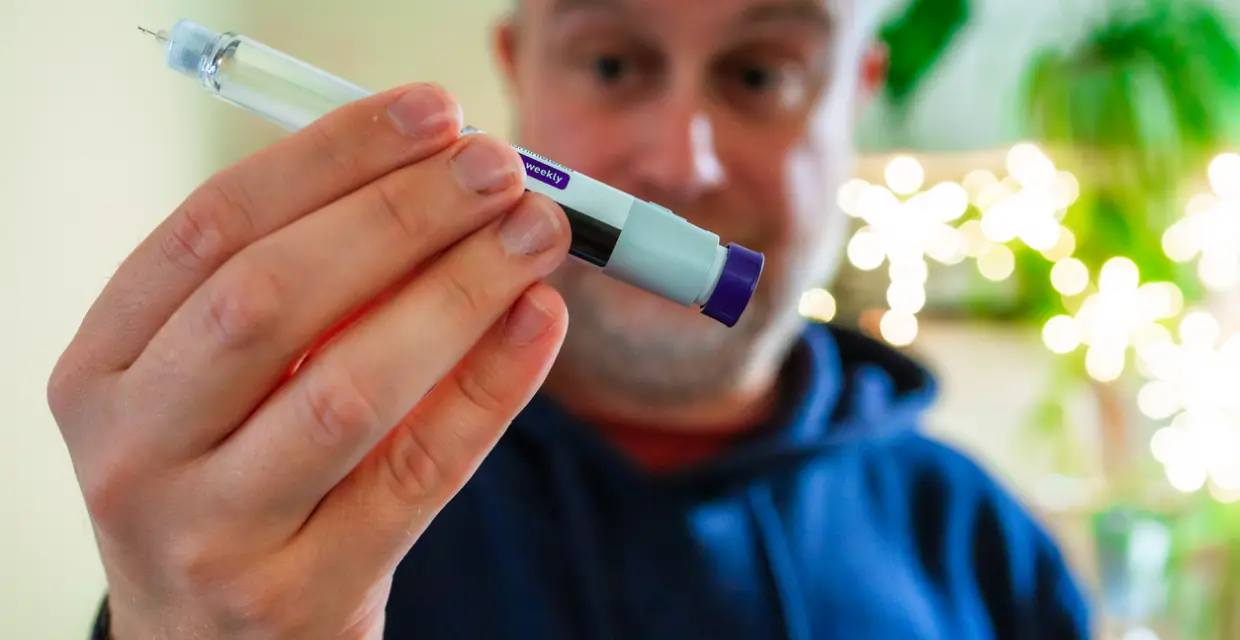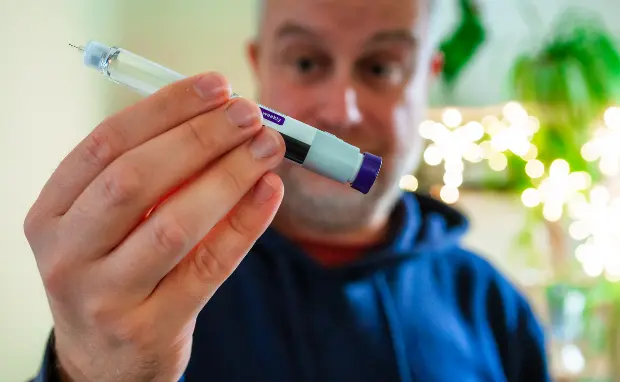Key Points
- Zepbound (tirzepatide) mimics two natural gut hormones that control appetite and blood sugar levels
- Zepbound takes about 30 days to leave the body after the last dose
- People who stopped taking Zepbound regained about 14% of their weight over a year
Wondering how long Zepbound lingers in your body? The answer is roughly 30 days from your last dose.
This timeline matters. It affects your dosing schedule, how long side effects last, and what happens when you discontinue treatment.
Understanding how long Zepbound stays active helps you set realistic expectations and make informed choices about your weight loss plan.
What is Zepbound?
Zepbound (tirzepatide) is a weight loss medication approved by the FDA for adults with obesity or those who are overweight with at least one weight-related health condition. It is an injectable.
In December 2024, the FDA also approved it as the first medication to treat moderate-to-severe obstructive sleep apnea in adults with obesity.
This makes it a dual-purpose treatment addressing both excess weight and sleep apnea.
How does Zepbound work?
Gia Eapen, MD, explains, "Zepbound activates receptors for two hormones your body naturally produces. By mimicking both GIP and GLP-1, it regulates your appetite, slows down how quickly food leaves your stomach, and improves how your body handles blood sugar. Together, these effects help you feel satisfied with less food and reduce cravings throughout the day."
What sets Zepbound apart is its unique mechanism. It's the first and only obesity treatment that activates both GIP and GLP-1 hormone receptors.
This leads to several key changes:
- Your stomach empties more slowly, making you feel fuller for a longer period
- Your appetite decreases naturally, and food cravings diminish
- Your pancreas releases more insulin while your liver produces less new glucose, helping stabilize blood sugar levels
How long does Zepbound stay in your system?
Gia Eapen, MD, says, “Zepbound has a half-life of five days. In simple terms, this means that every five days your body removes half of what's left. If you start with 100% on day one, by day five, 50% remains. By day 10, 25% remains. This pattern continues until the medication is gone, which takes about 30 days total.”
However, this timeline can vary. Your metabolism, the dose you're taking, and your health all influence how quickly Zepbound leaves your system.
What happens when you stop Zepbound?
Weight regain after stopping Zepbound is common. Without the medication, your appetite typically returns to normal as its effects on hunger hormones fade.
In one study, participants who stopped Zepbound after 36 weeks regained about 14% of their body weight over the next year. Those who continued treatment kept losing weight.
"Whether you're taking Zepbound for weight loss or obstructive sleep apnea, it’s important not to stop the medication without consulting your healthcare provider. They can create a gradual transition plan and evaluate alternative medications when necessary. They can also monitor your health during the transition," notes Eapen, MD.
How effective is Zepbound for weight loss?
Clinical research demonstrates significant results. Over 72 weeks of treatment, people taking the medication saw their body weight drop by 15% to 21% on average. Individual outcomes depended on which dose they used and how their body responded to treatment.
While these numbers are encouraging, medication alone doesn't tell the whole story. Success with Zepbound also depends on pairing it with healthy eating habits.
According to Rita Faycurry, RD, Registered Dietitian, "While Zepbound can be a powerful weight loss tool, nutrition remains the foundation of success. The medication helps manage appetite, but eating nutritious meals supports sustainable results. Think of it as your partner in this journey, not a replacement for healthy eating habits."
Final thoughts: How long does Zepbound stay in your system?
Zepbound’s 30-day clearance time means its effects don't disappear immediately but fade gradually. Before discontinuing Zepbound, consult your healthcare provider so that they can work on a gradual transition plan and monitor your health.
The habits you build while on medication become crucial for sustained success. Zepbound (tirzepatide) works best with lifestyle changes like a nutritious diet and regular physical activity, never as a replacement for them.
Frequently asked questions (FAQs)
How long until Zepbound wears off?
With a half-life of about five days, the medication may continue working for about 30 days until it is eliminated from your system.
How do you get Zepbound out of your system?
You don't need to do anything special. Your body naturally metabolizes and eliminates Zepbound over about 30 days. Talk to your healthcare provider before stopping Zepbound. Maintain healthy habits (diet and exercise) during this transition to support your overall well-being when taking tirzepatide.
Can I buy Zepbound in the US?
Yes, Zepbound (tirzepatide) is available in the United States by prescription. You can purchase it at pharmacies after a healthcare provider writes you a prescription.
Start losing weight on Zepbound. Find a registered dietitian covered by insurance.
The views expressed by authors and contributors of such content are not endorsed or approved by Fay and are intended for informational purposes only. The content is reviewed by Fay only to confirm educational value and audience interest. You are encouraged to discuss any questions that you may have about your health with a healthcare provider.
Sources
- Zepbound (tirzepatide) Injection, for subcutaneous use (2022)
https://www.accessdata.fda.gov/drugsatfda_docs/label/2025/217806Orig1s020lbl.pdf - FDA Approves First Medication for Obstructive Sleep Apnea (December 20th, 2024)
https://www.fda.gov/news-events/press-announcements/fda-approves-first-medication-obstructive-sleep-apnea - Tirzepatide Once Weekly for the Treatment of Obesity (June 4, 2022)
https://www.nejm.org/doi/full/10.1056/NEJMoa2206038 - Continued Treatment With Tirzepatide for Maintenance of Weight Reduction in Adults With Obesity (December 11, 2023)
https://jamanetwork.com/journals/jama/fullarticle/2812936











